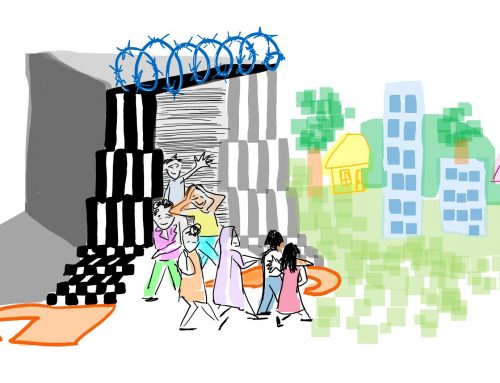Image by @Carcazan
The Detention Forum is publishing a series of blogs looking at the evidence behind calls for a 28-day time limit on immigration detention. In this blog, we look at the Bar Council’s report, Injustice in Immigration Detention: Perspectives from legal professionals.
Late last year, the Bar Council added its voice to the increasingly deafening chorus calling for an end to indefinite detention.
“The lack of a statutory time limit helps immigration detention to slip into the realms of convenience, punishment and deterrence. It causes significant psychological distress.”
The Bar Council
Almost every informed commentator accepts that fundamental to the reforms required, is the introduction of a statutory 28-day time-limit on detention. There are workable alternatives to detention. Read this independent report from SOAS, commissioned by the Bar Council. https://t.co/LRtp5xK08r
— Andrew Langdon QC (@westcrct) December 1, 2017
The report draws on a review of existing literature and interviews with over 20 legal professionals, including solicitors, barristers, judges, and other specialists. It identifies the barriers faced by people in detention to accessing a fair and efficient administrative and judicial decision-making system, which in turn undermines their fundamental right to liberty.
Lowlights include:
- The complexity of immigration law, which Alison Harvey (former Legal Director at ILPA) describes as “layer upon layer of inadequately thought out, hastily drafted legislation all too often incompatible with human rights and rule of law guarantees.”
- The wide-ranging scope of powers to detain, leaving too much to the discretion of the Home Office. Administrative guidance intended to fill in the blanks is “opaque” and frequently changing.
- The “culture of disbelief” and reliance on detention that permeates the Home Office. As Baroness Ruth Lister observes, “The current Home Office guidance that detention should be used sparingly and for the shortest possible period is rendered ineffective by working practices and culture.”
- Lack of access to the good quality, affordable legal advice and representation that individuals need to address these systemic shortcomings. According to BID, “The whole myth of legal aid, and ‘we’re OK detaining people because they have access to legal remedies’, just doesn’t play out in practice.”
- The detrimental impact of indefinite detention on individuals’ psychological wellbeing, which is likely to undermine their capacity to challenge their ongoing detention.
In the absence of independent, automatic judicial oversight, decisions to detain are made on the basis of administrative convenience and poorly defined risks of absconding and public harm. Home Office caseworkers are operating in an environment characterised by heavy workloads, insufficient training, inappropriate incentives, and little accountability.
Rewards for throwing the most people into detention is how we ended up deporting British citizens. The culture at the HO is sickening – an inhumane numbers game driven by Tory policy. https://t.co/kar0kF7aXe
— David Lammy (@DavidLammy) June 17, 2018
And, once someone is in detention, case law has proven inadequate in defining what is a “reasonable period” of detention. Even where someone is able to successfully apply for bail or bring a claim for unlawful detention, “Too much depends on access to the courts. This is not good public administration.”
“What we’ve seen with the proliferating unlawful detention litigation over the last five years is judges initially being horrified that migrants are being detained for administrative convenience for these periods and then becoming increasingly inured to it… it’s becoming normalised; this is precisely why we need a clear lead from parliament about what parliament considers acceptable.”
Jerome Phelps, former Director of Detention Action
Along with the Parliamentary Inquiry into Immigration Detention, the British Medical Association, Her Majesty’s Inspectorate of Prisons, the European Committee for the Prevention of Torture, the UN Committee Against Torture, and others, the Bar Council urges the government to implement a time limit on immigration detention to address some of these structural barriers.
Without a time limit, “Officials treat detention as an administrative matter which isn’t serious, because they have these powers to detain and no incentive to get on with doing the thing they are supposed to be doing.”
Barrister
The report also calls for:
- Automatic judicial oversight for all decisions to detain;
- An effective legal aid system ensuring that everyone has access to the representation they need to challenge the loss of their liberty;
- A ban on the use of prisons for detaining people under immigration powers;
- Special care for vulnerable people and survivors of torture held in administrative detention;
- A review and clarification of the criteria for administrative detention; and
- Resources directed towards “alternative and more humane ways” of managing the Home Office’s concerns about absconding, including community-based alternatives to detention.
You can access the full report online here.





